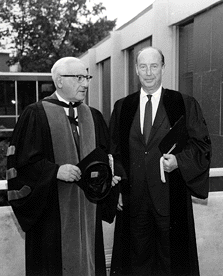1961-1962

 President Sachar with Adlai Stevenson
President Sachar with Adlai Stevenson
The university was just 13 years old when it won accreditation from Phi Beta Kappa, marking another achievement in Brandeis’ climb to academic excellence. President Sachar celebrated the event in grand style, holding a special convocation at which U.N. Ambassador Adlai Stevenson and other notables received honorary degrees.
—Staff
It was during the Phi Beta Kappa convocation that school photographer Ralph Norman’s “badly overstuffed sausage of a dog,” Cholmondeley, wandered onto the stage of world history and earned himself a permanent monument on the Brandeis campus. Cholmondeley apparently felt some recognition was due his own accomplishments in international diplomacy, for as Ambassador Stevenson’s degree award was being read, Cholmondeley waddled up to the podium and ceremoniously positioned himself to accept the degree.
Cholmondeley’s disappointment upon not receiving the honorary doctorate was assuaged later that semester when the newly-opened campus coffee shop was named in his honor. The shop offered “good food and coffee at low prices,” and was intended to provide a space where faculty and students could meet beyond the confines of classroom and lecture hall. Although Cholmondeley himself reserved comment on the distinction thus conferred upon him, a few observers thought he appeared rather puffed with pride during the next few weeks. (Others rejoined that he was merely puffed.)
—Staff
During his four years here, Charles Kamen ’61 had been one of the campus’s most outspoken students. He was also one of the first to sign up for President Kennedy’s new Peace Corps program, departing for training at Pennsylvania State University the summer after his graduation from Brandeis. After training, he would travel to the Phillippines, where Brandeis Professor Lawrence Fuchs was already preparing to lead a team of 630 volunteers.
Before he had completed training, however, Kamen was dismissed from the program. He was not the only volunteer to be rejected, but all the others had failed to satisfy some aspect of the training, while he had passed each phase with distinction.
Kamen’s outspokenness, it seems, had caught up with him. While visiting home in Miami, he had attended, and heckled, a showing of a blatantly distorted political film at the local Rotary Club. Word of this had somehow reached Peace Corps officials who, anxious to avoid embarrassment to their young program, decided Kamen was too big a risk. The dismissal rebounded briefly against them, however, when the story caught the interest of the national press. Kamen, in the meantime, was returned to the welcoming arms of the Miami draft board, who were only too happy for the opportunity to “teach him something about Americanism.”
—Staff
Stephen Solarz ’62 completed his term as Justice Editor-in-Chief at the end of the fall semester. It had been a rocky year for the student newspaper, which had struggled with a series of financial problems and continuous friction with members of the student government. In spite of these headaches, Solarz had preserved The Justice’s posture as standard bearer for the loyal opposition.
After completing his master’s degree at Columbia University, Solarz entered politics, winning election to the New York State Assembly and then to the U.S. Congress, where he served for 22 years. Putting aside his editor’s natural skepticism about the administration, he became one of several alumni who have served the university as members of its Board of Trustees.
—Staff